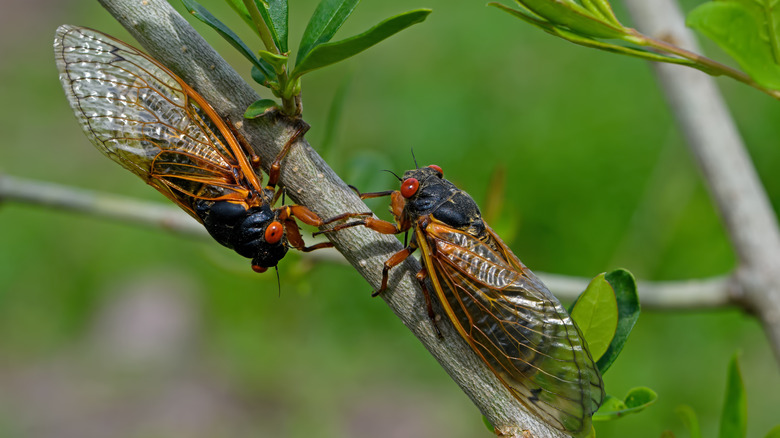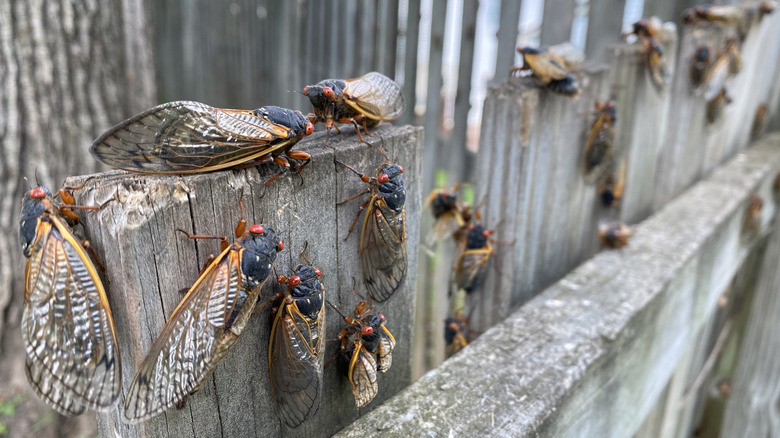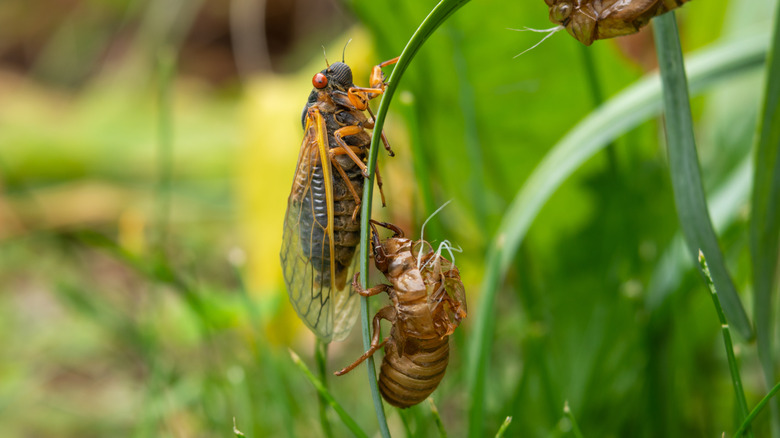Do The Cicadas In Your Yard Bite, And What Do They Sound Like?
If you've been following the news, you may have been alarmed by headlines heralding the upcoming emergence of both brood XIX and XIII cicadas. Having two periodic cicada broods emerge simultaneously is relatively uncommon, and these two specific broods have not co-emerged since 1803. Though 2024 will certainly be a big year for cicadas, there's nothing to be concerned about. While the insects can be quite loud, they are harmless to people and most garden plants.
Cicadas spend most of their life buried underground as nymphs. There, they feed on tree roots before finally emerging and molting into adults. Once they emerge from the ground, cicadas have only a few weeks to mate and lay eggs before dying. The eggs are laid in trees, and once the young nymphs hatch, they drop to the ground and burrow to repeat the cycle. While some types of cicadas can be heard and seen every year, these are generally annual or "dog-day" cicadas (Tibicen spp.). Periodical cicadas (Magicicada spp.), on the other hand, emerge as broods, which are synchronized to develop and emerge at the same time. These cicadas are generally on either 13-year cycles like brood XIX or 17-year cycles like brood XIII and are only found in the eastern United States.
The sounds of cicadas
Brood XIX's range is primarily in the southeastern U.S. and some parts of the midwest, including Iowa and Illinois. These cicadas will begin to emerge in late April and early May. Brood XIII, on the other hand, will emerge in May and June and is primarily in midwestern states including Illinois, Iowa, Michigan, and Wisconsin. Surprisingly, even in states where both broods will appear, they are unlikely to have significant overlap in their ranges.
Adult cicadas only live a few weeks, but during that time, they make their presence known with their distinctive buzzing sound that's often compared to power lines or electricity. The noise can be shockingly loud, easily reaching over 100 decibels, but it's for a good cause — it helps the cicadas to attract a mate. The noise, which is only made by the males, is achieved using the drum-like timbals on their sides.
Do cicadas harm people or gardens?
While they may be noisy, cicadas aren't dangerous and are incapable of injuring you. The University of Wisconsin notes that there are no records of cicadas transmitting diseases, either. You may find "honeydew" aka cicada urine raining from the sky though, so consider wearing a hat if you're expecting a lot of cicadas in your area. Cicadas are often attracted to the sounds of power tools, likely mistaking their sounds for cicada songs.
Cicadas rarely cause significant damage to trees or other plants, so it may not be necessary to protect your plants from cicadas. If you are concerned, you can spray the insects with a stream of water from your garden hose to discourage them from nesting in more fragile trees. Alternatively, netting can be used to keep cicadas out. The Environmental Protection Agency does not recommend using pesticides against cicadas, as pesticides don't work to deter cicadas and can harm other organisms.



